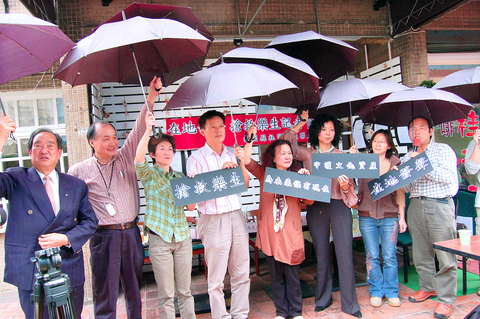Several celebrities from the art world visited the Lo Sheng Sanatorium yesterday and expressed support for its preservation based on its cultural value.
Among the figures were Lin Hwai-min (林懷民) and Hou Hsiao-hsien (侯孝賢). Lin is the founder of the Cloud Gate dance troupe and Hou is a renowned film director who has won several international film awards.
Lo Sheng is a leprosarium built in 1930 where thousands of lepers were once quarantined for life. A plan to tear down most of the buildings on the 17-hectare site to make room for a Mass Rapid Transport (MRT) depot has met with strong opposition.

PHOTO: CHEN WEN-CHUNG, TAIPEI TIMES
"People often believe the Lo Sheng case is a debate between a public construction project and a cultural heritage site ... That is wrong," said Liao Hsien-hao (廖咸浩), former director of the Taipei City Department of Cultural Affairs.
"It's not a win-lose game. Culture and public construction projects can actually coexist," Liao added.
Last year, a construction consultant company based in Britain proposed a design by which 90 percent of the leprosarium would be preserved, with the MRT depot being completed only a few months later than planned.
"We Taiwanese always try to arrange things. Why can't we arrange this?" Hou asked.
Hou added that Lo Sheng Sanitorium was a key relic in Taiwan's history.
"It [Lo Sheng] actually records our ignorance and the violence of the state in the past," Hou said.
Lin agreed, and warned that Taiwan would become a nation without memory if public works didn't respect history.
"We began to learn Taiwan's history in the 1980s. Yet, with cries for development, many of our historical markers have been torn down," Lin said.
"When I walked into this place, what I felt could never be replaced by history classes or textbooks," he added.
Since Lo Sheng's future remains uncertain, Hou said he wanted to make a documentary to record the struggle for the leprosarium's preservation.

Alain Robert, known as the "French Spider-Man," praised Alex Honnold as exceptionally well-prepared after the US climber completed a free solo ascent of Taipei 101 yesterday. Robert said Honnold's ascent of the 508m-tall skyscraper in just more than one-and-a-half hours without using safety ropes or equipment was a remarkable achievement. "This is my life," he said in an interview conducted in French, adding that he liked the feeling of being "on the edge of danger." The 63-year-old Frenchman climbed Taipei 101 using ropes in December 2004, taking about four hours to reach the top. On a one-to-10 scale of difficulty, Robert said Taipei 101

Taiwanese and US defense groups are collaborating to introduce deployable, semi-autonomous manufacturing systems for drones and components in a boost to the nation’s supply chain resilience. Taiwan’s G-Tech Optroelectronics Corp subsidiary GTOC and the US’ Aerkomm Inc on Friday announced an agreement with fellow US-based Firestorm Lab to adopt the latter’s xCell, a technology featuring 3D printers fitted in 6.1m container units. The systems enable aerial platforms and parts to be produced in high volumes from dispersed nodes capable of rapid redeployment, to minimize the risk of enemy strikes and to meet field requirements, they said. Firestorm chief technology officer Ian Muceus said

MORE FALL: An investigation into one of Xi’s key cronies, part of a broader ‘anti-corruption’ drive, indicates that he might have a deep distrust in the military, an expert said China’s latest military purge underscores systemic risks in its shift from collective leadership to sole rule under Chinese President Xi Jinping (習近平), and could disrupt its chain of command and military capabilities, a national security official said yesterday. If decisionmaking within the Chinese Communist Party has become “irrational” under one-man rule, the Taiwan Strait and the regional situation must be approached with extreme caution, given unforeseen risks, they added. The anonymous official made the remarks as China’s Central Military Commission Vice Chairman Zhang Youxia (張又俠) and Joint Staff Department Chief of Staff Liu Zhenli (劉振立) were reportedly being investigated for suspected “serious

Nipah virus infection is to be officially listed as a category 5 notifiable infectious disease in Taiwan in March, while clinical treatment guidelines are being formulated, the Centers for Disease Control (CDC) said yesterday. With Nipah infections being reported in other countries and considering its relatively high fatality rate, the centers on Jan. 16 announced that it would be listed as a notifiable infectious disease to bolster the nation’s systematic early warning system and increase public awareness, the CDC said. Bangladesh reported four fatal cases last year in separate districts, with three linked to raw date palm sap consumption, CDC Epidemic Intelligence